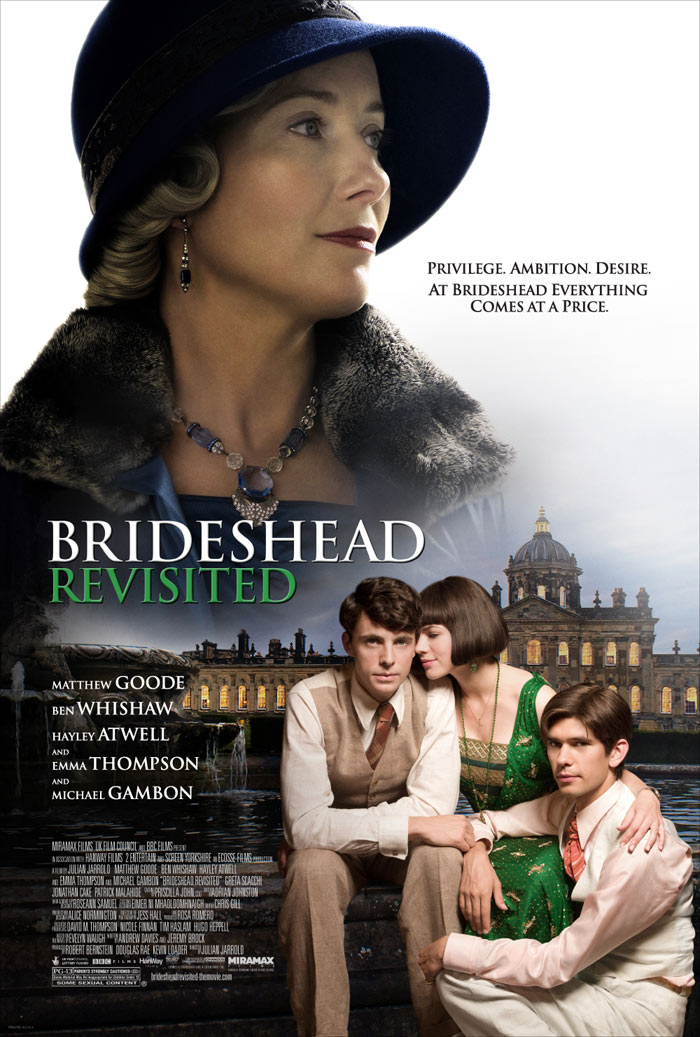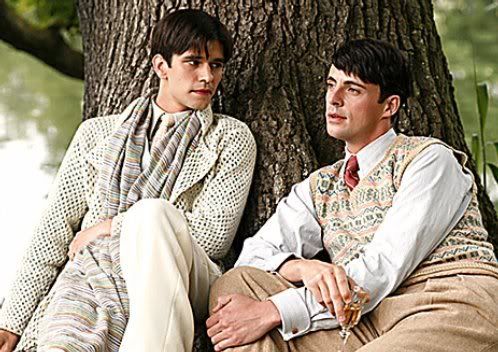

Director: Julian Jarrold, 2008.
Brideshead Revisited is based on the book by Catholic writer Evelyn Waugh. Set in pre-World War 2 England, it is the story of Charles Ryder (Matthew Goode) and his friendship with brother and sister Sebastian (Ben Whishaw) and Julia Flyte (Hayley Atwell), a friendship that turned into forbidden love.
The opening scene captures the main theme and forms an archway with the closing scene. We see the back of an officer walking out of a castle with his voice-over narration:
If you asked me now who I am, the only answer I could give with any certainty would be my name: Charles Ryder. For the rest, my loves, my hates, down even to my deepest desires, I can no longer say whether these emotions are my own or stolen from those I once so desperately wished to be. On second thoughts, one emotion remains my own. Alone among the borrowed and the secondhand, as pure as that faith from which I am still in flight. . . guilt.The film explores the theme of guilt, and how it impacts a family. But it is not just guilt, there is grace, too, along with the sin that brings on the guilt. In flashback we learn the story of Charles' interactions with Brideshead Castle and the family who made it their home.
 Charles, a middle-class young man and aspiring artist, leaves his widowed father in London to go up to Oxford to study history. Through a chance encounter he becomes friends with Sebastian Flyte, a homosexual and profligate. But Sebastian is also a Lord and can afford to waste his time and money at Oxford. As their friendship develops, Sebastian takes Charles to visit his home, Brideshead Castle, but he won't let him meet his mother. When he finally does, it is clear why Sebastian has been avoiding this. His mother, Lady Marchmain (Emma Thompson), is a strict Roman Catholic, ruling her family as a domineering matriarch.
Charles, a middle-class young man and aspiring artist, leaves his widowed father in London to go up to Oxford to study history. Through a chance encounter he becomes friends with Sebastian Flyte, a homosexual and profligate. But Sebastian is also a Lord and can afford to waste his time and money at Oxford. As their friendship develops, Sebastian takes Charles to visit his home, Brideshead Castle, but he won't let him meet his mother. When he finally does, it is clear why Sebastian has been avoiding this. His mother, Lady Marchmain (Emma Thompson), is a strict Roman Catholic, ruling her family as a domineering matriarch.Lady Marchmain rules with guilt, ladling it out alongside her religion as a means of control. But instead of forming a bedrock foundation for her family, as the grace of Christianity should do, guilt causes the opposite. Sebastian and Julia pull away from their mother. As grace is freeing, guilt apart from grace is legalistic. It leads to division and separation. In trying to control her family, she lost her husband and then little by little her children Sebastian and Julia.
 That summer Charles is lured to Brideshead to spend the vacation there, and he and Sebastian wile away the lazy days drinking and swimming and picnicking. But one night they drink too much and Sebastian advances on Charles and they share a kiss. A kiss that leaves them awkward and unsure of their relationship. When Sebastian and Julia declare they want to visit their father and his mistress in Venice, Lady Marchmain, sensing Charles is respectable, suggests he go too. But there is an ulterior motive: she wants him to keep tabs on Sebastian.
That summer Charles is lured to Brideshead to spend the vacation there, and he and Sebastian wile away the lazy days drinking and swimming and picnicking. But one night they drink too much and Sebastian advances on Charles and they share a kiss. A kiss that leaves them awkward and unsure of their relationship. When Sebastian and Julia declare they want to visit their father and his mistress in Venice, Lady Marchmain, sensing Charles is respectable, suggests he go too. But there is an ulterior motive: she wants him to keep tabs on Sebastian.In Venice we find Lord Marchmain (Michael Gambon), a likable rogue who has turned away from the rigidity of his wife's faith to become agnostic, living in sin. It is in Venice that Charles realizes he is drawn to Julia not Sebastian. And during a night of carnival revelry, Charles and Julia kiss. Another kiss, another awkward relationship. What adds fuel to the fire is Sebastian witnessing this, and realizing the object of his affection, Charles, does not reciprocate. Such unrequited love causes Sebastian to turn to drink with a vengeance, and he becomes an alcoholic.
 Of course Lady Marchmain learns of the attraction to Julia, and she makes it clear that Charles can never marry Julia. This is not a result of class division; it is strictly a clash of competing religions. Julia is Catholic, at least in the eyes of her mother. And Charles is an avowed atheist, which itself is a faith belief in no God. Two faiths come head-on into collision and Catholicism wins. Indeed, at Julia's birthday party where her surprise engagement to a Canadian is announced, Lady Marchmain banishes Charles for giving money to Sebastian to fund his rampant alcoholism. Forbidden love, forbidden friendship.
Of course Lady Marchmain learns of the attraction to Julia, and she makes it clear that Charles can never marry Julia. This is not a result of class division; it is strictly a clash of competing religions. Julia is Catholic, at least in the eyes of her mother. And Charles is an avowed atheist, which itself is a faith belief in no God. Two faiths come head-on into collision and Catholicism wins. Indeed, at Julia's birthday party where her surprise engagement to a Canadian is announced, Lady Marchmain banishes Charles for giving money to Sebastian to fund his rampant alcoholism. Forbidden love, forbidden friendship.Years later, Charles is an accomplished artist and married. While on a cruise with his wife showing his art, he spots Julia, also married. Pursuing her, they rekindle their forbidden love now that her mother is dead. Leaving his wife, Charles takes Julia back to Brideshead to face her husband and negotiate a divorce settlement. He does so, but as they leave they see her father returning to Brideshead. He is terminal and has come home to die. Julia cannot leave her father and so they stay. While on his death-bed, Lord Marchmain receives the sacrament of last rites and receives grace and absolution for his sins. He has not only returned to Brideshead, he has returned to his faith. And in doing so, he causes Julia to reflect on her faith and her guilt causes her to separate from Charles.
 Lord Marchmain offered a cynical view of Catholic faith earlier when he said he thought it was wonderful because it allowed a person to sin and then be forgiven through confession. He recognized the grace of God's offer of forgiveness, a forgiveness that is as true for followers of Jesus. Yet, his approach was one of licentiousness. And Paul combats this errant thinking in Romans 6:13, when he says, "What then? Shall we sin because we are not under law but under grace? By no means!" Grace is sufficient to provide forgiveness and draw the sinner to the merciful and loving God. But not as means to habitual sin, a constant shaking the fist in the face of God.
Lord Marchmain offered a cynical view of Catholic faith earlier when he said he thought it was wonderful because it allowed a person to sin and then be forgiven through confession. He recognized the grace of God's offer of forgiveness, a forgiveness that is as true for followers of Jesus. Yet, his approach was one of licentiousness. And Paul combats this errant thinking in Romans 6:13, when he says, "What then? Shall we sin because we are not under law but under grace? By no means!" Grace is sufficient to provide forgiveness and draw the sinner to the merciful and loving God. But not as means to habitual sin, a constant shaking the fist in the face of God.Charles was seduced by what he saw at Brideshead and in Venice: ambition, desires, privilege, a life of sensual pleasures. He wanted to become like the Flytes, to be one of them. But he was not prepared to adopt their religion. Still, he followed this path like a lamb to the slaughter. The Bible warns of giving into the cravings the world offer, calling it "the lust of the eyes" (1 Jn. 2:16). Every temptation has its price. In the end Charles lost all that he had. He wanted what he could not have and was willing to give up what he had in an attempt to gain his forbidden love. To no avail. He ended up with secondhand emotions created by copying those he emulated. How often do we crave what we cannot have and refuse to see what we do have? The saying goes, the grass is always greener on the other side. But the reality is something else entirely.
In many ways Brideshead Revisited is similar to Atonement. Both are set in the period between the two world wars. Both are visually beautiful. Both focus on the interaction between middle or lower class men and upper class women. Both deal with themes of sin, guilt and redemption. Both, indeed, have unsympathetic characters. But Brideshead has a stronger story and a stronger cast. Thompson is perfect as the ice-queen ruling her family having pushed her husband away. Goode holds his own as the tragic hero, and has good chemistry with Atwell. And Whishaw is excellent as the fragile son who cannot please his mother and turns to his own way in an act of rebellion.
The closing scene, years later still, returns to the opening scene. Charles is back at Brideshead. He goes into the family chapel, and sees the candle burning there. About to extinguish it, he finds he cannot and turns away. He stills feel guilt and cannot put out the light. In some sense, the grace that has been present all along has touched Charles and is drawing him away from his atheism. Indeed, his guilt is evidence perhaps of his recognition of his moral failures, which as an atheist he could deny. Perhaps as the Light of the World, Jesus, cannot be extinguished so in some small way Charles leaves a testimony to the truth of grace; this is a witness to the work of grace in his own guilt-filled heart. If so, that is indeed a work of grace.
Copyright ©2009, Martin Baggs

No comments:
Post a Comment